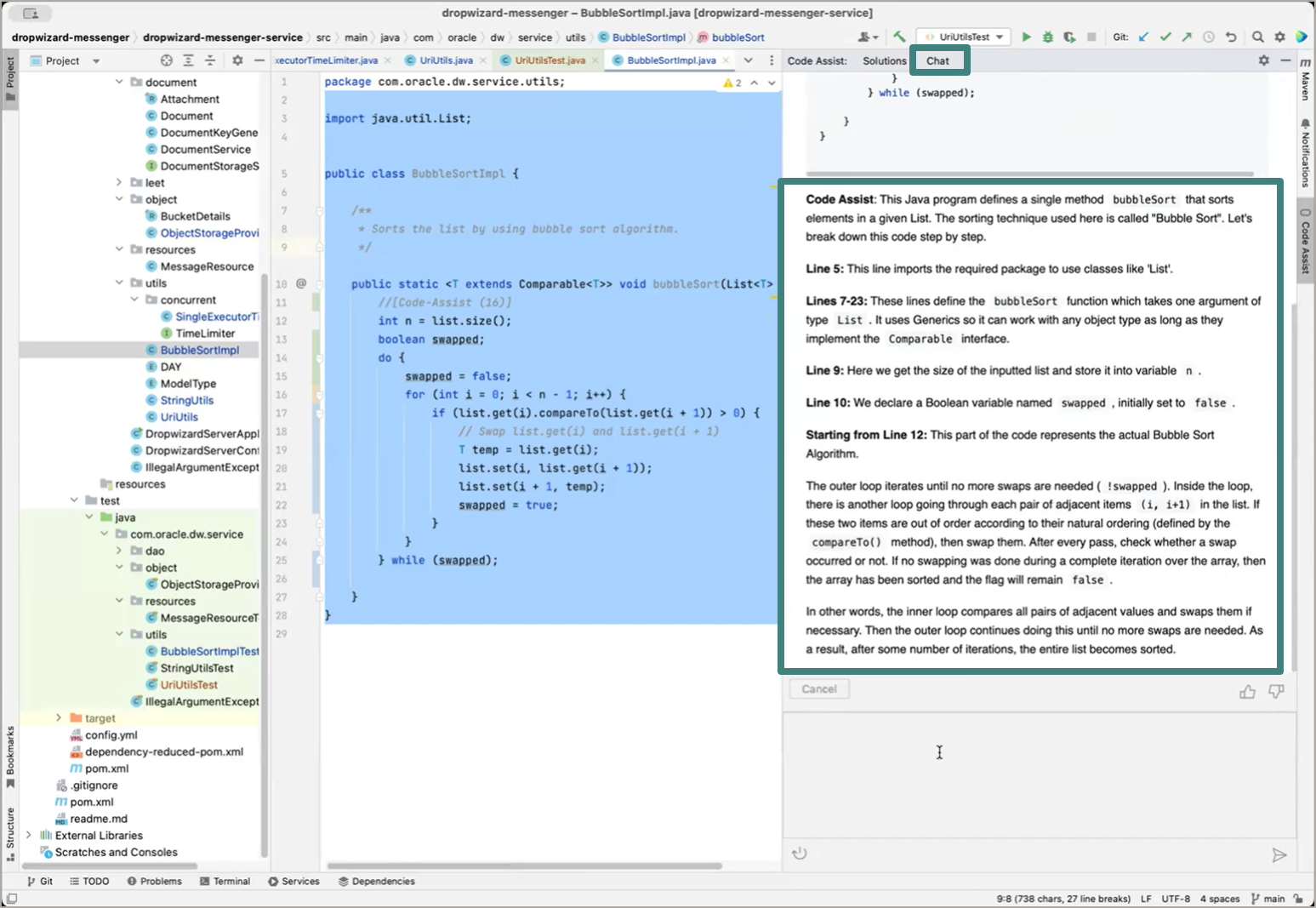The initial portion of this post was published as a contributed article on The New Stack on March 12.
Last year, the 2024 Stack Overflow Developer Survey reported on the development community’s embrace of AI code assistants. Of more than 1,700 respondents, the majority (76%) indicated that they’re using or planning to use AI code assistants. According to Gartner®, “by 2028, it is expected that 90% of enterprise software engineers will utilize AI code assistants, a significant increase from less than 14% in early 2024.”1 That’s a huge increase, corresponding to a nearly 60% compound annual growth rate.
What are AI code assistants?
AI code assistants, also known as AI code companions, are tools that help developers generate and analyze software. The assistants use large language models (LLMs) trained for coding languages, such as Java and Python. Software developers prompt AI code assistants with a combination of natural language and code snippets to aid in their jobs, which can result in higher productivity and quality, new learning and insights, and so on.
AI code assistants often integrate into developers’ preferred programming environments, such as Microsoft Visual Studio Code and JetBrains IntelliJ IDEA, and typically provide the following capabilities:
- Generate code snippets to fulfill a developer’s request
- Upgrade legacy code into a newer version
- Translate code into different languages
- Describe or explain code to facilitate learning
- Generate documentation as part of the DevOps process
- Create test cases and artifacts that span multiple scenarios

Can AI code assistants increase developer productivity?
AI code assistants help improve developers’ efficiency by summarizing, explaining, answering, and ultimately offloading the creation of necessary but “not necessarily fun” boilerplate code. The more mundane tasks a developer can shift to an AI helper, the more time they have to do other, more rewarding work.
Michele Rosen, IDC research manager in the low-code, no-code, and intelligent developer technologies practice, wrote in the introduction to IDC Innovators: GenAI Coding Assistants, March, 2024, “Organizations are increasingly looking to GenAI coding assistants to help increase developer productivity amid the continuing shortage of technical talent. The ability of these assistants to generate, explain, and document code represents an opportunity for organizations to accelerate and simplify the development of digital solutions.”
The potential impact is material. Gartner projects that, “by 2028, systematic adoption of AI code assistants in 2023 will result in at least 36% compounded developer productivity growth.”2
Can AI code assistants increase developer satisfaction?
Research indicates that developer productivity is much more than simply time spent (or saved) writing code. A person’s productivity is also influenced by their satisfaction and well-being, their ability to communicate and collaborate effectively, and—especially for developers—their ability to achieve and maintain a “flow state.”
Developers can derive satisfaction from using AI code assistants because assistants can help remove the drudgery of repetitive and unfulfilling tasks, such as creating standard blocks of code and generating routine documentation. And, to the extent that these tools can help prevent context switching—when one is interrupted or needs to do something else because the current task is blocked—developers can remain in a flow state.
Can AI code assistants boost an organization’s bottom line?
The increased job satisfaction that AI code assistants can help developers to attain can contribute to job retention. Happier developers tend to stay longer in their jobs than those who aren’t as happy. And job satisfaction and retention can improve organizational results by minimizing the cost and disruption of employee turnover.
Job retention is a gift that keeps on giving. Teams stay intact, mentors stay engaged, and junior developers come to view the organization as a great place to learn, build, and grow their skills. Satisfied developers generate higher quality applications, which leads to more satisfied customers and ultimately higher profit with lower churn. It’s a virtuous cycle where everybody wins.

Does Oracle offer an AI code assistant?
In May 2024, Oracle announced Oracle Code Assist, an AI code assistant designed to help Oracle and NetSuite customers and partners boost developer velocity and enhance code consistency. Thousands of developers within Oracle and NetSuite use Code Assist in their work to create new services and features; it helps them by generating code, building and running unit tests, producing documentation, and providing answers to coding questions.
Oracle Code Assist is in beta
Code Assist is currently in beta for external users and is initially optimized for Java, but it can also work for most modern programming languages, including Python, JavaScript, SuiteScript, Rust, Ruby, Go, PL/SQL, C#, and C. It’s being used as a plugin in both the Visual Studio Code and IntelliJ IDEA developer environments.
The beta program is an opportunity for external developers to access the latest Java-optimized Code Assist capabilities. Users who participate in the beta program have a unique opportunity to voice their opinions about current and upcoming features before they’re released. Feedback plays an important role in helping us improve the product for everyone.
During beta, users can try the following Code Assist capabilities:
- Generate code to help improve productivity
- Generate unit tests to help increase coverage
- Annotate code to help improve readability
- Explain code to help accelerate learning
- Provide chat-based answers to coding-related questions
- Gather user feedback to improve the offering

Key benefits of Code Assist
Code Assist offers the following primary benefits:
- Boost developer velocity: Code Assist can help you increase the speed of your development of applications and customizations with context-specific suggestions and explanations that can reduce time spent on the most routine aspects of your job. Using AI to handle common and mundane coding tasks can give you more time for strategic initiatives.
- Enhance code consistency: Code Assist can help you create software that aligns with your organization’s best practices. You can tailor the tool to your organization’s own codebase, libraries, policies, application dependencies, and practices to help you create software consistent with those proprietary input parameters.
- Optimized for Java, SuiteScript, PL/SQL, and application development on Oracle Cloud Infrastructure (OCI): Code Assist can help you update, upgrade, refactor, and modernize polyglot code. While it can support many different programming languages, and you can deploy your applications anywhere, Java development is currently the prime focus of the beta program, and SuiteScript is planned to soon join. No organization knows more about Java than Oracle, the steward and main developer of the Java platform.
Code Assist architecture, privacy, and security
Code Assist has two main components: A development environment plugin that serves as the user interface and a backend service that runs the service and models. The plugin offers context-based help, a free-form chat, and a prompt interface. The plugin is responsible for composing the prompt that’s delivered to the service’s backend. The plugin also collects usage metrics and user feedback to help Oracle understand how Code Assist is being used and gauge customer satisfaction.
The Code Assist backend is an API -connected service for code-specific requests and responses used by the plugin. The service performs inference on OCI GPUs running optimized LLMs and exposes a streaming interface for lower perceived latency and increased user responsiveness.
Oracle understands and respects that customer privacy is important to you. The Code Assist backend service employs your prompt and any code provided only temporarily, until a satisfactory response is provided. When Code Assist delivers the response, your prompt is deleted. Likewise, Code Assist doesn’t collect personally identifiable information (PII).

How to get started
To apply to be an Oracle Code Assist beta tester, complete the following steps:
- Navigate to the Oracle Beta Programs page for Code Assist.
- Complete and submit the recruitment form. A separate recruitment form and legal agreement are required per beta program. Application submission requires an Oracle single sign-on (SSO) account. You must create an account tied to your corporate email address if you don’t have one.
- Execute the legal terms provided after you submit the form.
The Oracle Beta Programs office reviews your application, and your company is notified by email upon acceptance into the beta program.
To learn more about the highly differentiated capabilities of Oracle Code Assist, we invite you to attend one of the upcoming Oracle CloudWorld Tour or Oracle Dev Tour events, which will have sessions, networking, and multiple Code Assist demonstrations.
1 Gartner webinar, The Gartner Magic Quadrant™ for AI Code Assistants, https://www.gartner.com/en/webinar/674243/1507064.
2 Gartner, How to Communicate the Value of AI Code Assistants, 21 March 2024. GARTNER is a registered trademark and service mark and Magic Quadrant is a trademark of Gartner, Inc. and/or its affiliates in the U.S. and internationally and is used herein with permission. All rights reserved.
The preceding is intended to outline our general product direction. It is intended for information purposes only, and may not be incorporated into any contract. It is not a commitment to deliver any material, code, or functionality, and should not be relied upon in making purchasing decisions. The development, release, timing, and pricing of any features or functionality described for Oracle’s products may change and remains at the sole discretion of Oracle Corporation.
